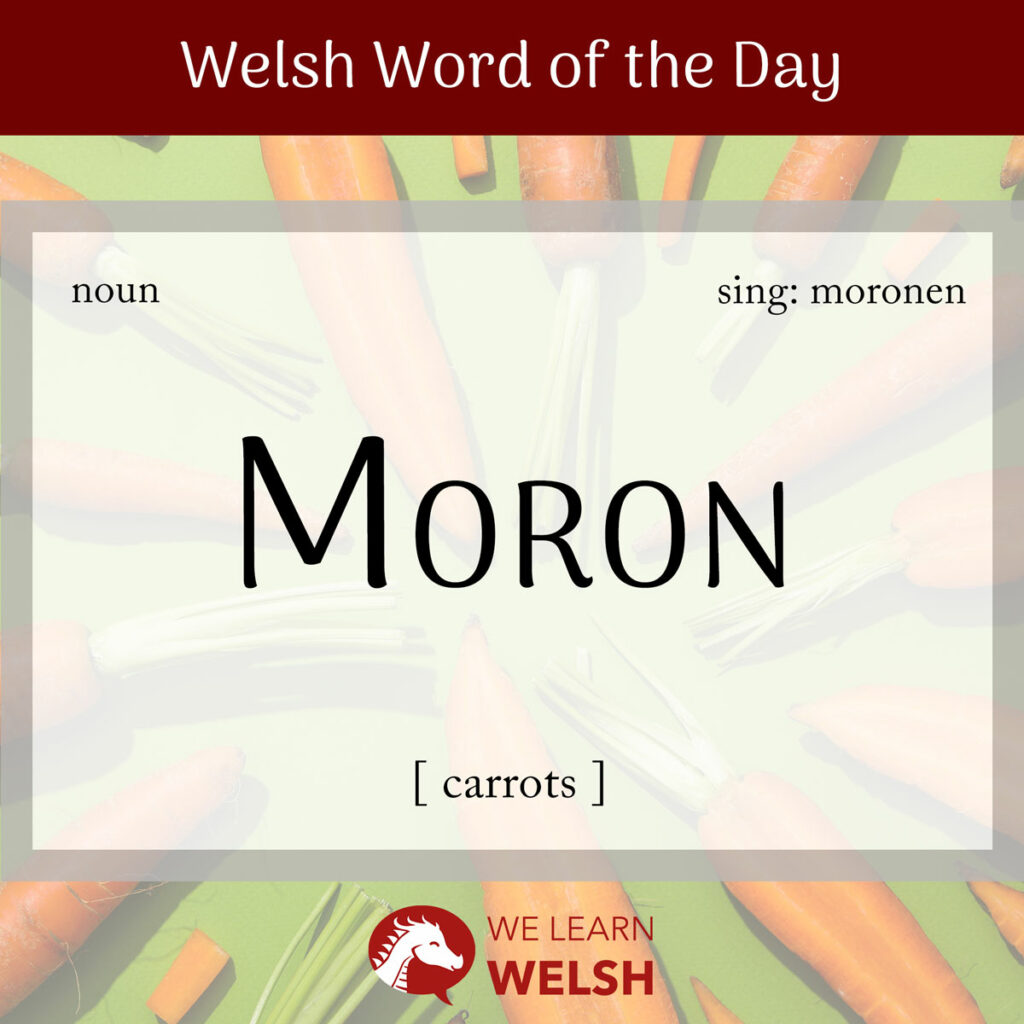The primary school I went to had two separate ‘streams’, one taught in English with supplementary Welsh lessons, and one taught in Welsh with supplementary English lessons. I remember that the English stream kids used to find the Welsh word moron absolutely hilarious – because it sounds like the English moron meaning idiot.
Of course, moron in Welsh is completely unrelated. It’s got nothing to do with anyone’s intelligence, and actually means carrots. That didn’t get in the way of a lot of moron-related playground banter!
moron
carrots
moronen
a carrot
That being said, the word does actually come from English originally. It’s a borrowing of the old English word moran which was used to refer to various edible root llysiau (vegetables) like moron and pannas (parsnips).
The linguistic relationship between carrots and parsnips persists in Welsh, because moron gwynion (white carrots) is a fairly common synonym for pannas in parts of North Wales. In this case moron cochion (red carrots) or even llysiau cochion (red vegetables) may be used to differentiate the two, although I would say that this usage is becoming less common and may sound old-fashioned.
Plus, the wildflowers called water parsnips are dyfrforon in Welsh.
Soft mutation
foron
Nasal mutation
N/A
Aspirate mutation
N/A
Moran and the singular more were native English words, derived from proto-Germanic, that were eventually displaced by carotte, a borrowing from the French. So in this case, the Welsh word is actually more English than the English!
That being said, in parts of Wales, carrot has shown up too – Welsh-ified to produce loan words like carotsen, carotsien and cratsen. Still, moron and moronen remain standard and more common.
Rydyn ni’n bwriadu trio rysáit newydd sy’n cynnwys moron.
We’re planning to try a new recipe involving carrots.
You may have noticed that I’ve chosen to name this article after the plural moron (carrots) instead of the singular moronen (a carrot). This isn’t just because of the similarity to the English word, but because in Welsh, moron is actually the default version of the word and what you’ll hear most often.
It’s quite common in Welsh for nouns, especially the names of planhigion (plants), to be known by their plural form as default, and for the singular to be derived from it rather than vice versa. This is called the collective-singulative plural system, as opposed to the singular-plural plural system that is used almost ubiquitously in English.
Another interesting thing about collective nouns is that the gender of the singulative is very often feminine. This isn’t universally the case, but it’s a noticeable pattern, and does apply to moronen.
This tells us two things. Firstly, it explains why the word is moronen and not moronyn. The suffix –en and –yn are both common endings to turn collective nouns into singulatives, but the former is for feminine nouns and the latter for masculine.
Secondly, it means that the carrot is y foronen, with a soft mutation.
Berwon ni’r moron i gyd.
We boiled all of the carrots.
Moron are a much-loved gwreiddlysieuyn (root vegetable) known for their distinctive lliw (colour) of bright oren (orange). They’re a staple bwyd (food) in the diets of many cultures, served in various kinds of stiw (stew) and cawl (soup) across Europe, wedi gratio (grated) in Indian puddings, and of course wedi rhostio (roast) on Sunday dinners in the UK.
Aside from pannas, other examples of gwreiddlysiau (root vegetables) include tatws (potatoes), casafa (cassava), nionod / winwns (onions), iamau (yams), garlleg (garlic), maip (turnips), and swêds (swedes).
They’re very iachus (healthy), full of fitaminau (vitamins) A and K. They are also a good source of potasiwm (potassium). However, the idea that they help us gweld (see) in the dark is unfortunately a myth!


